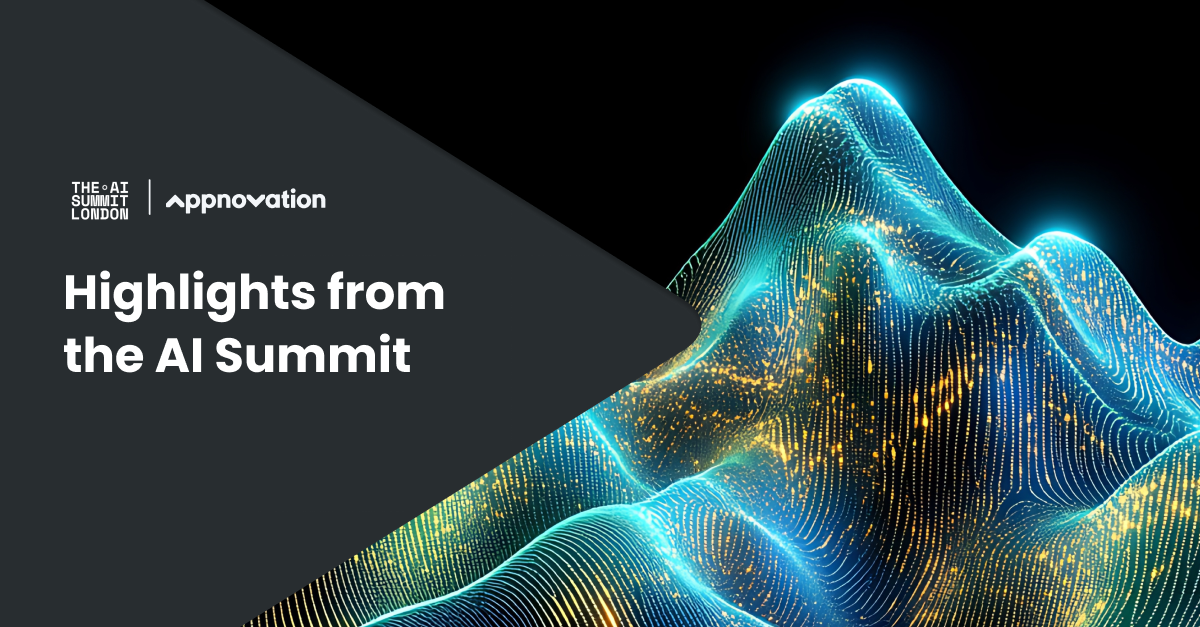Clare Fisher, Associate Director of Client Services at Appnovation, shares her reflections from the recent AI Summit in her debut LinkedIn blog. From the rise of AI agents to ethical adoption and the evolving human role, Clare offers sharp insights into how AI is reshaping industries—from banking to healthcare.
Just reflecting on some of the discussions and highlights from the recent AI Summit, there are so many that it seemed like time to write my first LinkedIn blog post!
The use of AI is already rapidly transforming industries, acting as a powerful tool that requires expertise and precise application to unlock its full potential.
Key Takeaways & Points of Focus:
The Rise of AI Agents: There was an increasing focus on AI agents designed for enterprise. These aren't just tools; they're becoming digital partners embedded in core enterprise systems. Transforming how AI is put to work by moving beyond reporting to actively anticipating needs and acting on them, driving efficiency.
High Expectations: There's a high expectation placed on AI. I experienced those as I entered the summit, where some attendees commented about the expectation of having facial recognition scanners instead of bringing ID to the summit. For businesses, theres a need to focus on the value and truly understand customer problems to achieve success with AI. During the conference it was emphasised that successful AI implementation hinges on audience adoption, it's crucial to benchmark its performance to demonstrate incremental value and foster continued use.
Lloyds Banking Group spoke about how they have been leveraging AI to transform their knowledge management solution across 40,000 employees. Using humans to manage customer conversations, but informed by the AI systems to provide customer value. The humans ensure a connected conversation, but instead of focussing on the process and administrative effort, they are able to effectively and quickly resolve complaints by having the answers at their fingertips.
AI Revolutionizing Healthcare: Healthcare stands at the forefront of AI innovation. Companies like AstraZeneca are aiming to "rewrite the rules" to transform patient outcomes, leveraging AI for complex tasks and to drive productivity and creative growth. AI promises to significantly reduce drug development cycle times and costs, which typically involve 15 years and a 90% failure rate for new drugs. AI can assist in computational tests and the repurposing of existing drugs, helping to discover science rather than replacing it. In oncology, AstraZeneca views AI as key to unlocking personalised medicine by providing doctors with crucial data signals.
The Critical Challenge of Data: While AI offers immense possibilities, data remains the biggest hurdle. Over 80% of AI projects reportedly fail due to incorrect or untimely data, with 90% of time often spent on data collection. Ensuring diverse, high-quality, and governed datasets is paramount, as is maintaining patient trust when sharing sensitive data in clinical trials. As one speaker succinctly put it: "With AI, science is not the limit, data is".
Upskilling the Workforce & The Human Element: The shift towards AI necessitates widespread upskilling within organisations. Gartner advises that AI will lead to 0.5 billion net new jobs, highlighting the need for continuous learning as roles evolve. It was fantastic to hear how companies like AstraZeneca are proactively addressing this through internal certification programs, like "Thriving in the Age of AI," making learning accessible and engaging across all levels and roles. The consensus is that AI will not replace humans, but empower them to do more productive, higher-value work. Human insight and "gut feel" will continue to be important, even alongside data.
Ethical AI & Trust: Responsibility and ethics are central to AI adoption. Models must be explainable so that professionals, such as doctors or scientists, can trust the results. The question of liability for AI-driven decisions is critical, reinforcing the need to keep the human in the loop, particularly in sensitive areas like clinical decision-making and medical devices. Data set opening needs to be governed to ensure equality and democracy in healthcare.
The future looks bright when human knowledge and skills are combined with technology. It's not about replacing humans, but transforming how we work and innovate.


